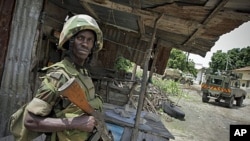Somalia's government has declared a state of emergency in parts of the capital formerly controlled by the Islamist militant group, al-Shabab.
The decree issued Saturday by Somali President Sheik Sharif Sheikh Ahmed says clan militias are banned from what he called the "liberated" areas of Mogadishu.
The government is trying to exert authority in the former al-Shabab districts to prevent local warlords from seizing control. Authorities have largely relied on 9,000 African Union troops to maintain order in the capital since Al-Shabab fighters retreated from the city a little more than a week ago in the face of a government and AU offensive.
Meanwhile, a top United Nations official, Emergency Relief Coordinator Valerie Amos, praised neighboring Kenya on Sunday for accepting some 70,000 Somalis who have fled to Kenyan refugee camps in the past two months. She said the flow of refugees into the Dadaab encampment has slowed in recent days,but said the number of malnourished children arriving in the camp of 400,000 registered refugees continues to grow.
Amos spoke in Nairobi, after a three day mission in Kenya and Somalia.
Saturday, the African Union said it had discovered a large cache of weapons left behind by al-Shabab.
An AU spokesman said troops found and destroyed 137 artillery shells in a neighborhood that was controlled by the militants.
Security forces have warned that al-Shabab may have also left behind bombs in the areas they abandoned.
The insurgent group once controlled nearly all of Mogadishu and still controls large sections of southern and central Somalia.
Its departure from Mogadishu has enabled the United Nations to scale up aid efforts to the drought and famine-stricken city. Al-Shabab has tightly controlled the delivery of aid to areas under its control, and has banned access for many international aid agencies.
Some information for this report was provided by Reuters.




